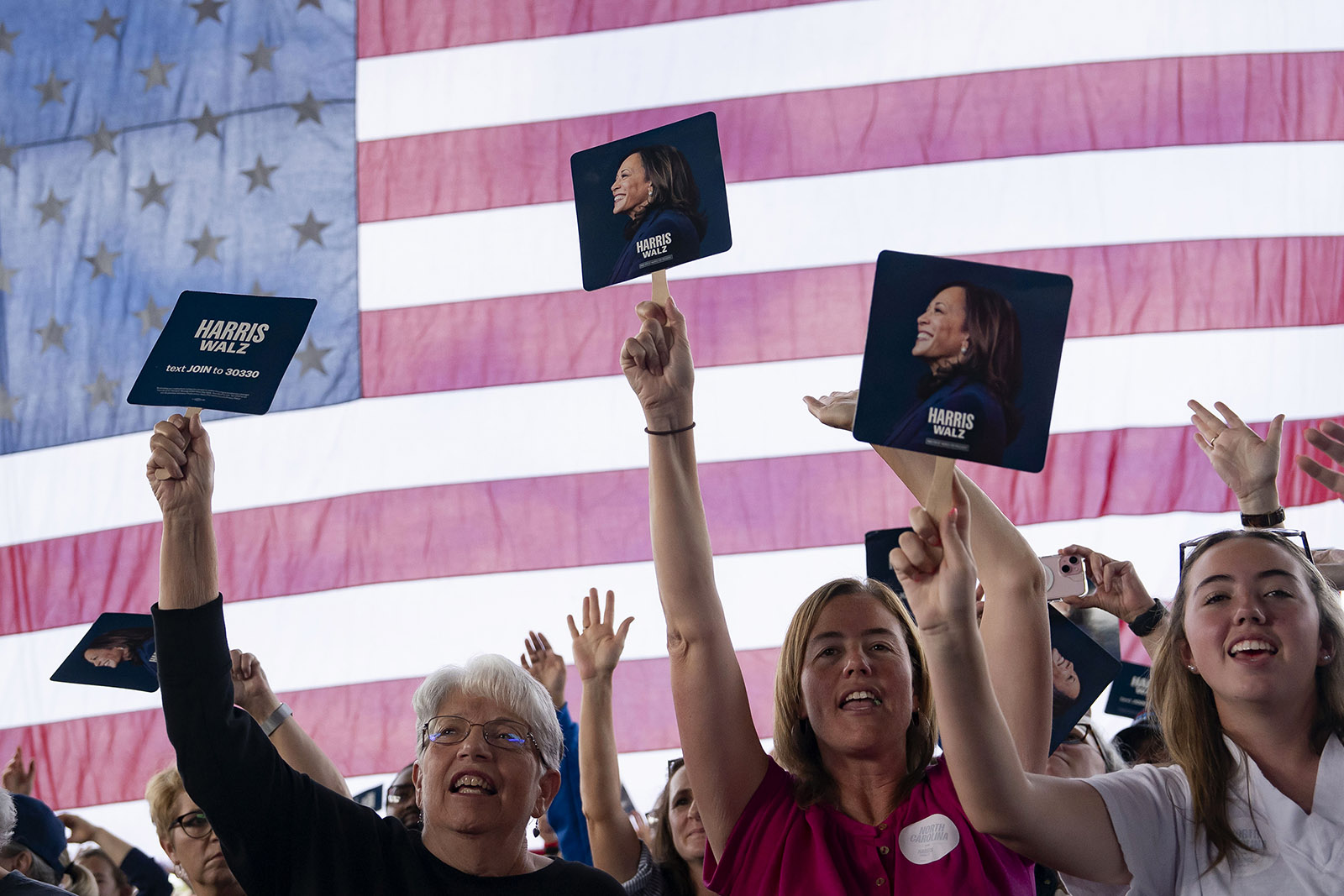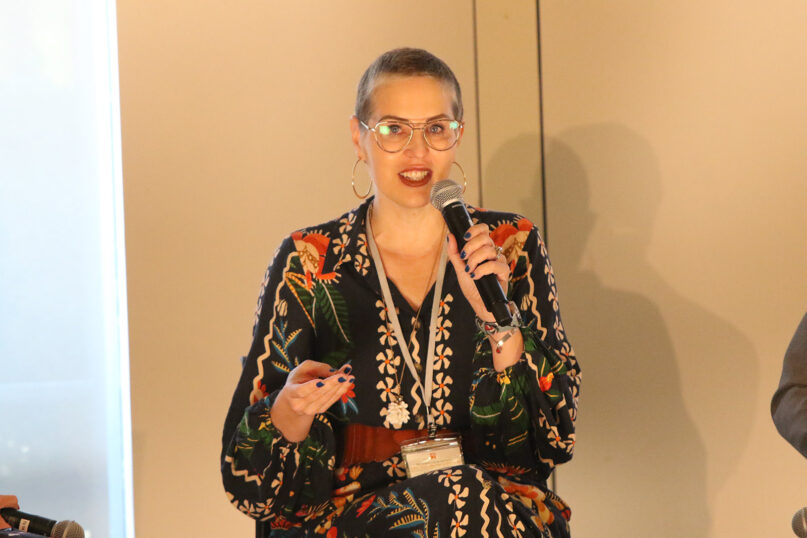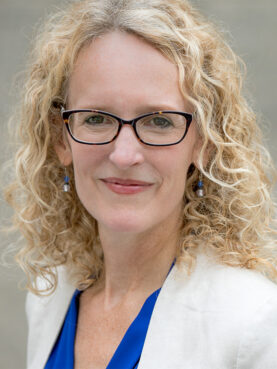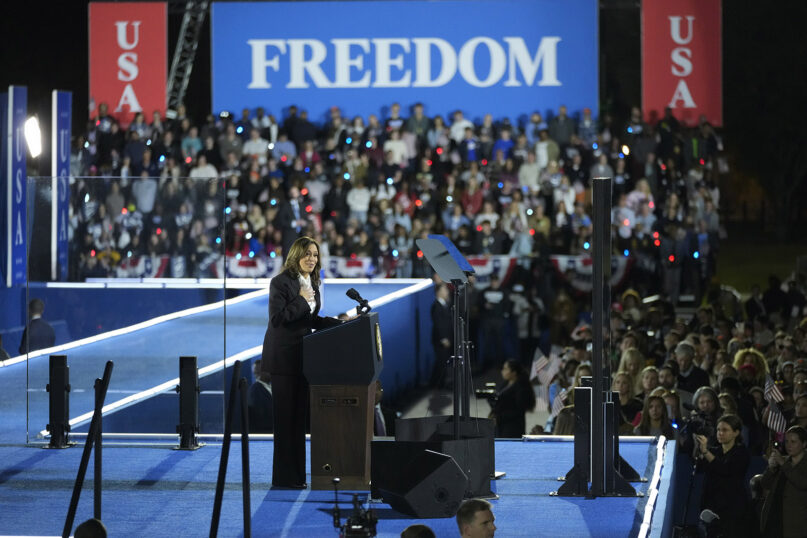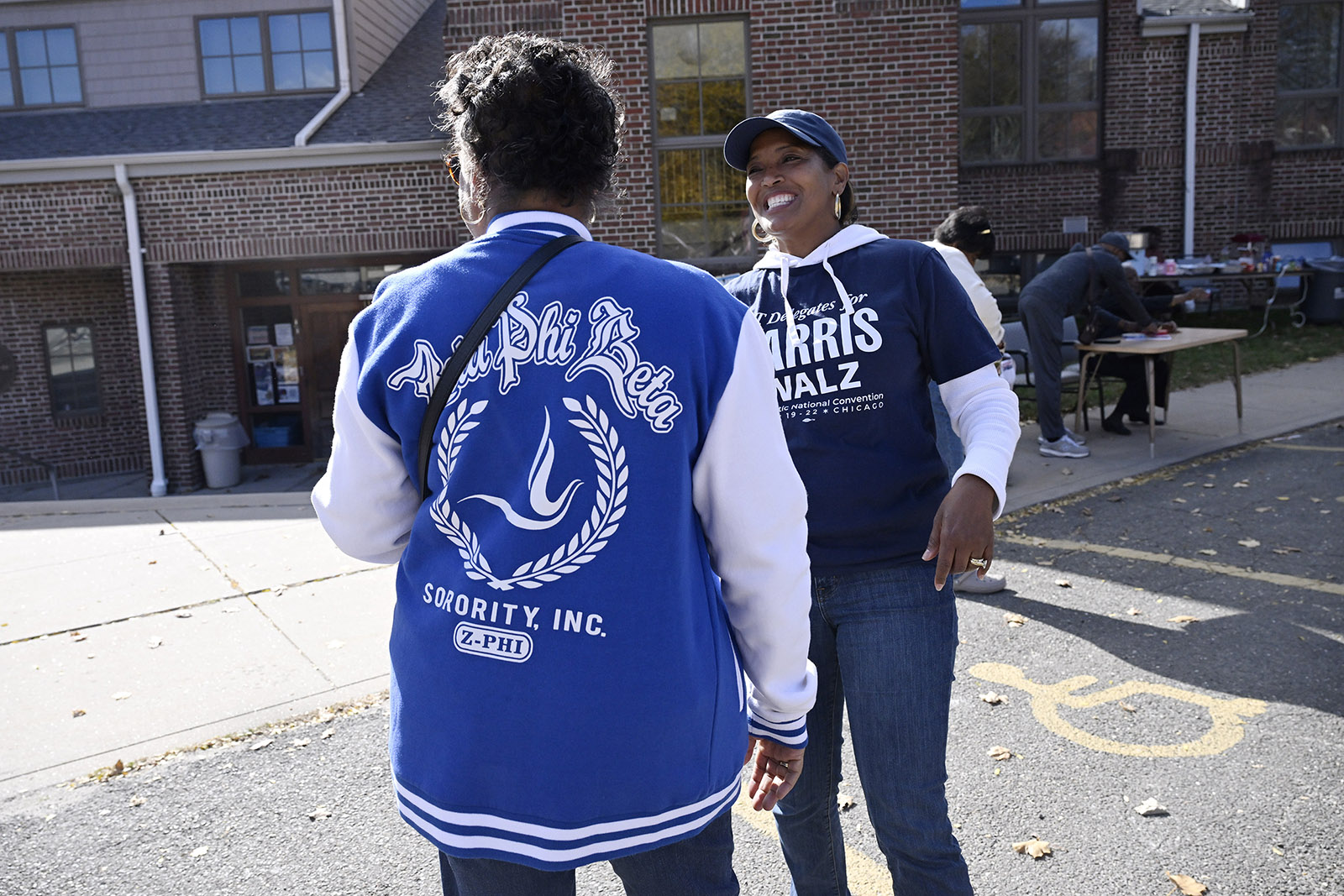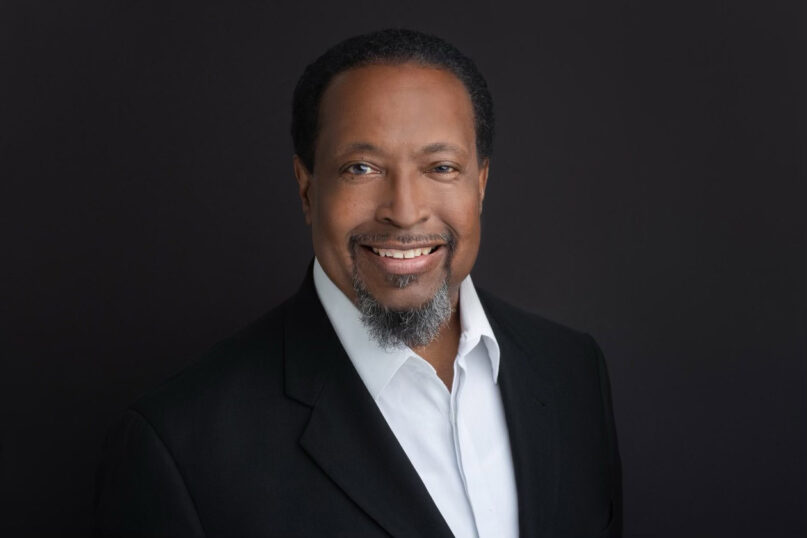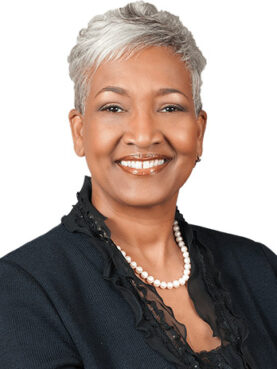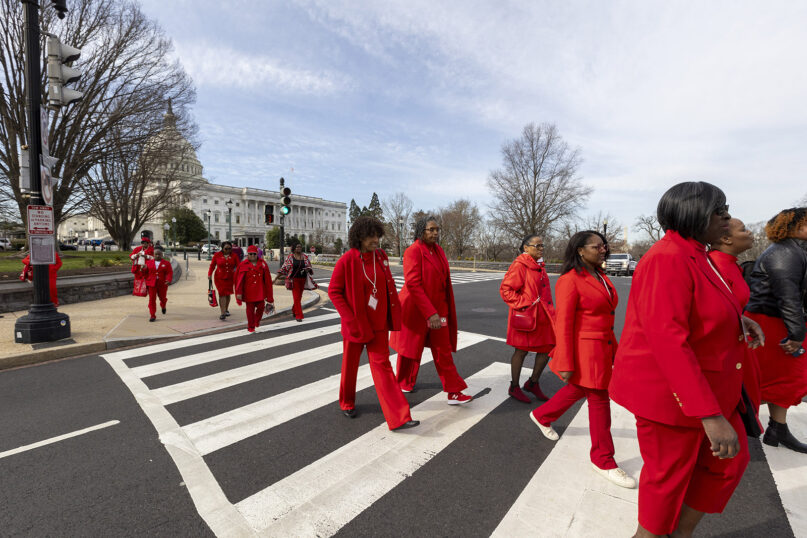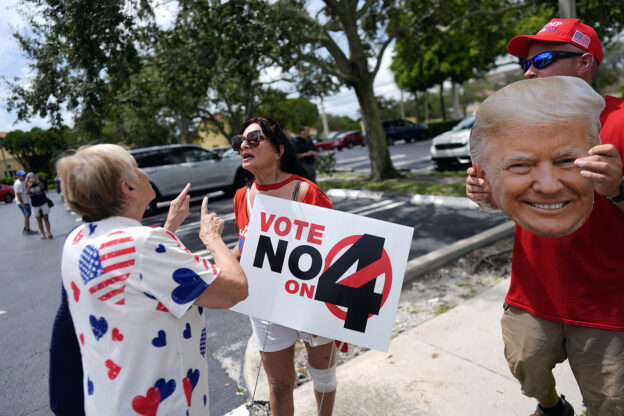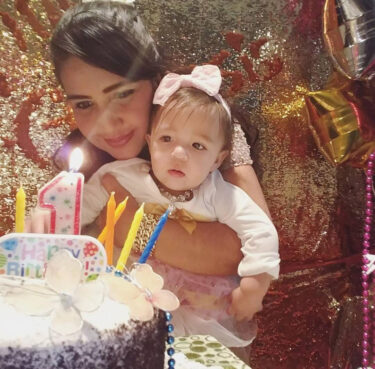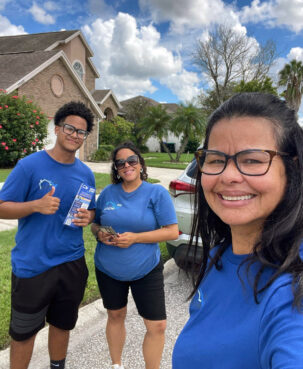(RNS) — On Election Day 2024, one is on offer.
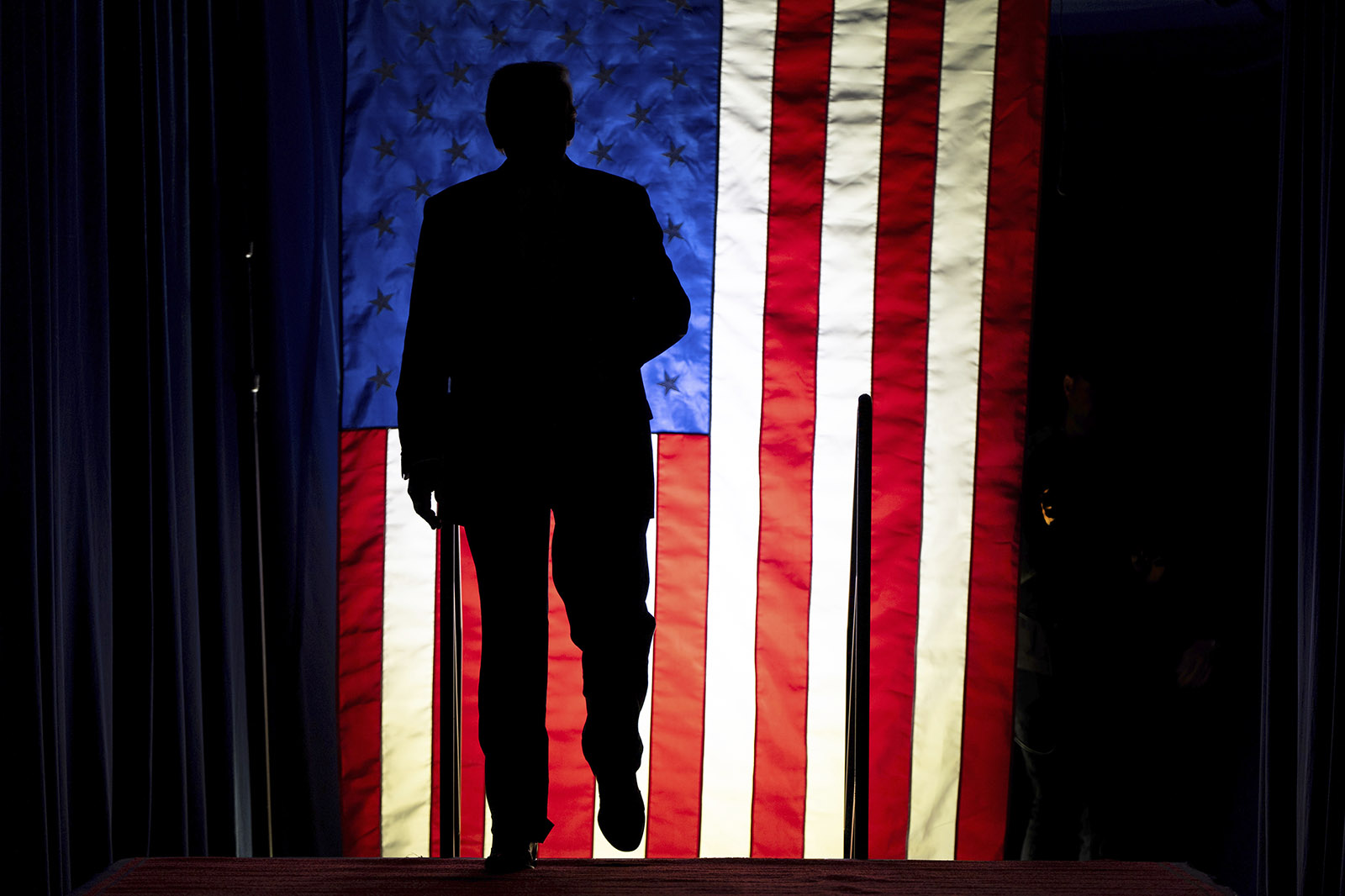
Republican presidential nominee former President Donald Trump arrives to speak at a campaign rally at Rocky Mount Event Center, Oct. 30, 2024, in Rocky Mount, N.C. (AP Photo/Julia Demaree Nikhinson)
Mark Silk
October 31, 2024
(RNS) — From Russia and Hungary to Turkey and India to the U.S. of A., actual and wannabe authoritarians make a practice of imbuing their movements with religious significance, in a way that identifies them with the sacred dimension of their nations.
All nation-states sacralize themselves to some degree. In the U.S., texts from the Declaration of Independence to Martin Luther King Jr.’s “I Have a Dream Speech” are treated as holy, and Washington is littered with temples and shrines, from the Lincoln and Jefferson memorials and the U.S. Supreme Court to the various war memorials. Not to mention our military sites — the battlefield at Gettysburg, the Valley Forge camp and above all the burial grounds for those who served in the armed forces such as Arlington National Cemetery.
We have come to call this civil religion, defined by the Italian scholar Emilio Gentile as “the conceptual category that contains the forms of sacralization of a political system that guarantee a plurality of ideas, free competition in the exercise of power, and the ability of the governed to dismiss their governments through peaceful and constitutional methods.” In Gentile’s view, “civil religion respects individual freedom, coexists with other ideologies, and does not impose obligatory and unconditional support for its commandments.”
This civil religious inclusivity helps explain why we ban partisan political activity in U.S. military cemeteries — a ban Donald Trump was widely regarded as having violated in August, when he visited Arlington with family members of military personnel killed in the United States’ 2021 withdrawal from Afghanistan. The headline on a column by USA Today’s Marla Bautista read, “Trump’s appalling desecration of Arlington National Cemetery shows he still can’t be trusted.”
Only something sacred can be desecrated.
The opposite of civil religion is what Gentile calls “political religion”: “the sacralization of a political system founded on an unchallengeable monopoly of power, ideological monism, and the obligatory and unconditional subordination of the individual and the collectivity to its code of commandments.” Political religion is therefore “intolerant, invasive, and fundamentalist, and it wishes to permeate every aspect of an individual’s life and of a society’s collective life.”
A historian of fascist Italy, Gentile is above all interested in the expressly secular totalitarianisms of the mid-20th century. Mussolini, Hitler and Stalin, he argues, constructed fascism, Nazism and communism as national political religions to some extent modeled on familiar religious beliefs and forms.
Civil religion and political religion à la Gentile are, to be sure, ideal types. A civil religion can have aspects of a political religion, and a political religion may likewise incorporate civil religious forms.
Thus, with the onset of the Cold War, American civil religion was expressed so as to exclude atheistic communists. The addition of the words “under God” to the Pledge of Allegiance in 1954 was explicitly intended to differentiate the U.S. from the Soviet Union and its godless supporters, as was the designation of “In God We Trust” as the national motto two years later.
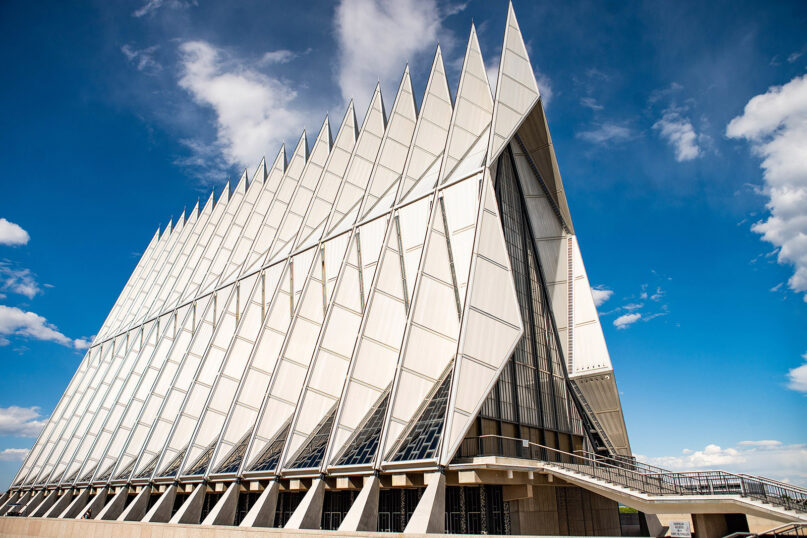
The Air Force Academy chapel in Colorado Springs, Colo.
A quintessential expression of that moment is the Air Force cadet chapel in Colorado Springs, Colorado, built in 1959. It is, in form, a militarized version of a Christian church — an apparent expression of political religion. But it is very much an expression of the civil religion of the times in featuring separate Protestant, Catholic and Jewish chapels inside.
Contrast this with the cathedral of the Russian military, consecrated in 2020: a Russian Orthodox church with no nod to religious inclusion in a country that is only 40% Russian Orthodox and where fewer than half the citizens consider themselves Christians of any sort. It perfectly expresses the alliance Russian President Vladimir Putin has made with Russian Patriarch Kirill, harking all the way back to the linkage of church and state in the Byzantine Empire.

Russian Orthodox Church Patriarch Kirill, center, and Russian Defense Minister Sergei Shoigu, right, at the consecration of the Cathedral of Russian Armed Forces outside Moscow, June 14, 2020. (Oleg Varov, Russian Orthodox Church Press Service via AP)
A mini-me version of Putin’s political religion has been cooked up by Hungarian Prime Minister Viktor Orbán, who governs with the idea of “illiberal democracy” — a nice term for populist authoritarianism. Presenting Orbán with the “gold degree” of the Order of St. Sava, Serbian Orthodox Patriarch Porfirije praised him for “defending Christianity.” Orbán “fights for the soul of Europe,” the patriarch said. Replied the prime minister, “We are peaceful people, we want peace, but there is indeed a war for the soul of Europe, and without Christian unity – including Orthodoxy – we cannot win this battle.”
Such use of religion can look like Turkish Prime Minister Recep Tayyip Erdogan’s incorporation of Islam into his own authoritarian regime. The difference is that where Erdogan’s Islamism serves to appeal to Turkey’s sizable conservative Muslim population, the Christianism (to put it that way) of Putin and Orbán has no significant religious grassroots constituency, but seems all about rebuilding a postcommunist authoritarian ideology. In the case of Hungary, it resists at once immigration (from Muslim countries) and the pluralistic liberal culture of Western Europe.
How religious constituencies function under authoritarian regimes depends, of course, on how they view those regimes, and vice versa. A half-century ago, Shiite Muslims protested against the authoritarian Shah of Iran, who sought a connection to the glory days of the pre-Islamic Persian Empire. In 1979, these turned into parades supporting the authoritarian regime of Ayatollah Ruhollah Khomeini, which promoted Islamic legal authority as the basis for a theocratic political religion.
A different kind of switching sides occurred in Myanmar, where religious power resides in the community of Buddhist monks. In 2007, the monks denied legitimacy to the military regime by refusing to accept its alms — symbolically represented by “turning over” their begging bowls. The regime yielded but reestablished its power via a genocidal campaign to rid the country of the Muslim minority Rohingya, in which anti-Muslim monks played an ideological role.
Meanwhile, hostility to Islam has been at the center of the Hindu nationalism successfully advanced by Indian Prime Minister Narendra Modi. Its ideology of Hindutva has generated a postsecular political religion that builds on hostility to Muslims in India dating to the Moghuls.
In America, meanwhile, Donald Trump’s incorporation of a form of Christianity into his MAGA movement is personified by his principal spiritual adviser Paula White, a Pentecostal pastor who has praised Trump as “chosen by God to protect religious values.”
White has been strongly influenced by the New Apostolic Reformation, a politically ambitious collection of charismatic Christians who are the subject of “The Violent Take It by Force,” an important new book by Matthew D. Taylor, a senior scholar at the Institute for Islamic, Christian, and Jewish Studies. Credited with providing Christian nationalists with their marching orders, the NAR should be understood as promoting a political religion based on Christian supremacy summed up in the so-called Seven Mountains Mandate.
The mandate holds that Christians should ascend to dominion over the “mountains” of contemporary culture: family, religion, education, media, arts and entertainment, business and government. As Taylor puts it in describing one of the movement’s leaders, while he “speaks the language of democracy and justice and constitutional rights, his ultimate vision is a retrenchment from democracy in the church and society.”
I don’t want to suggest that the MAGA movement is all about establishing the NAR political religion. But there’s no question that NAR ideas have spread through MAGA world.
As for Trump himself, it’s anything but clear that he knows or grasps the Seven Mountains Mandate. But like other authoritarian leaders, he is driven inexorably toward the exclusivism of a political religion. And it’s the NAR’s political religion that’s on offer from the Republican Party this Election Day.\\
The ‘Courage Tour’ is attempting to get Christians to vote for Trump − and focused on defeating ‘demons’
(The Conversation) — The ‘Courage Tour,’ a religio-political rally, is going around battleground states. It is focused on defeating Democrats, but also on defeating ‘demonic forces.’
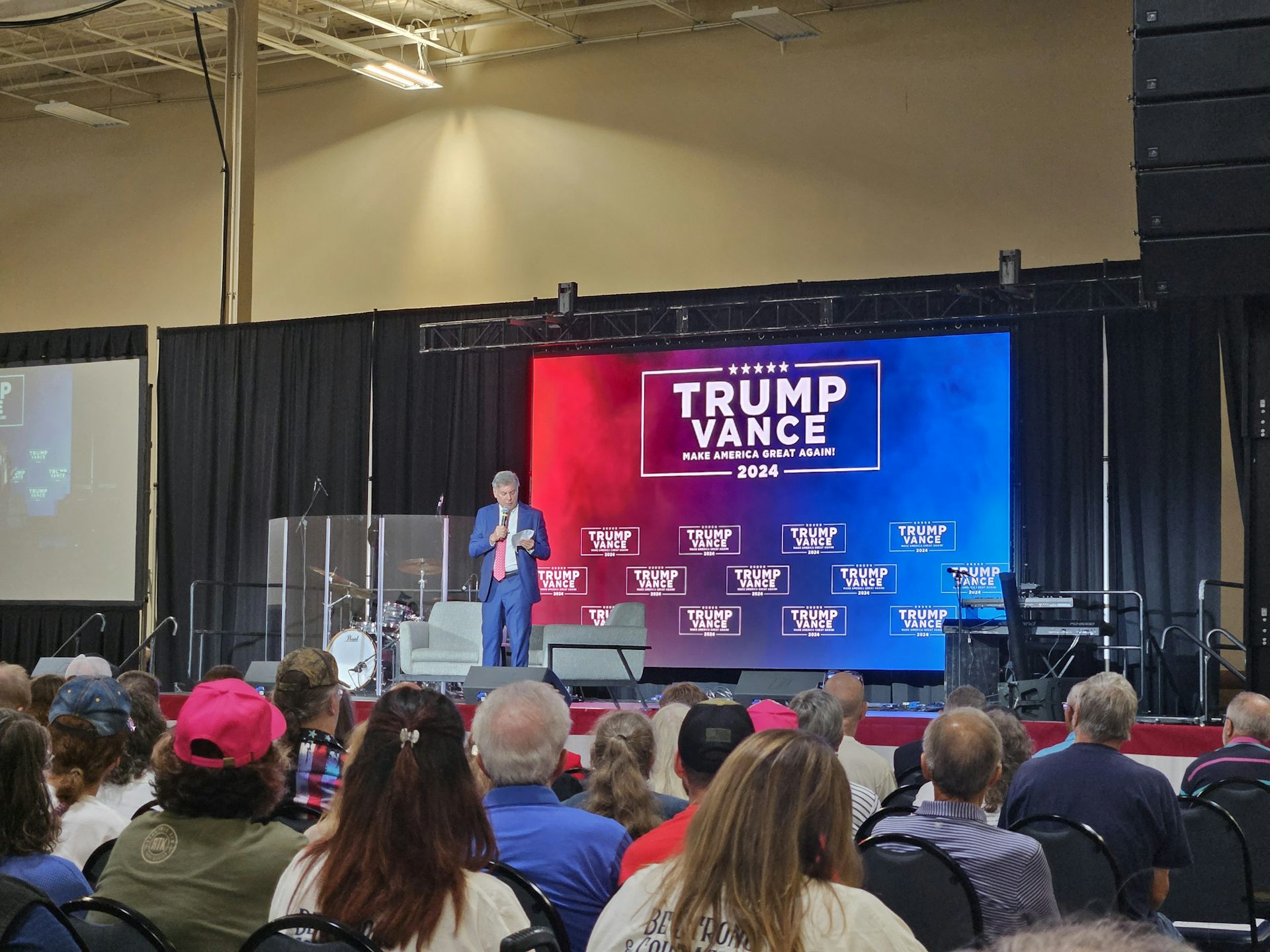
Michael E. Heyes
October 30, 2024
(The Conversation) — As a scholar of religion, I attended the “Courage Tour,” a series of religious-political rallies, when it made a stop in Monroeville, Pennsylvania, from Sept. 27-28, 2024.
From what I observed, the various speakers on the tour used conservative talking points – such as the threat of communism and LGBTQ+ “ideologies” taking over education – and gave them a demonic twist. They told people that diabolical forces had overtaken America, and they needed to expel them by ensuring Donald Trump was elected.
The tour is attempting to get those Christians to vote for Trump. The tour has moved through several battleground states such as Arizona, Michigan and Georgia, drawing several thousand people at every site.
The tour is not only focused on defeating Democrats but also on defeating demons. The idea that demons exert a hold over the material world is a key feature of the New Apostolic Reformation, or NAR, worldview. The NAR is a loose group of like-minded charismatic Christian churches and religious leaders – sometimes termed “prophets” – who want to see Christians dominate all walks of life.
As someone who recently finished a book on the intersection of demons and politics, “Demons in the USA: From the Anti-Spiritualists to QAnon,” I was eager to see this combination for myself. I believe it would be a mistake to think that the New Apostolic Reformation is a fringe group with no real influence.
The influence and reach
The group has an associated nonprofit organization known as Ziklag – named for a town in the Hebrew Bible that is an important site associated with David’s kingship – with deep pockets for the movement’s goals. A ProPublica investigation found that the group had already spent US$12 million “to mobilize Republican-leaning voters and purge more than a million people from the rolls in key swing states, aiming to tilt the 2024 election in favor of former President Donald Trump.”
The Southern Poverty Law Center calls the New Apostolic Reformation “the greatest threat to U.S. democracy that you have never heard of.”
The diffuse nature of NAR membership and its rapid growth make it difficult to gauge followers: Estimates have placed the number of NAR adherents between 3 million and 33 million, but individuals who may not label themselves as part of the NAR might nevertheless agree with the group’s theology.
Moreover, Republican vice presidential nominee JD Vance’s presence at the meeting I attended is also a tacit and significant endorsement for this group.
The ‘Seven Mountain Mandate’
According to NAR’s theology, there are “seven mountains” that govern areas of worldly influence, and Christians are destined to occupy all of them. These mountains are religion, government, family, education, media, entertainment and business.
Known as the “Seven Mountain Mandate,” this “prophecy” first rose to prominence in 2013 with the publication of “Invading Babylon: The 7 Mountain Mandate,” written by Bill Johnson, lead pastor of Bethel Church in Redding, California, and member of the NAR, and Lance Wallnau, NAR prophet and one of the founders of the Courage Tour. In the book, the Seven Mountain Mandate is trumpeted as a message received directly from God.
The NAR perceives the majority of these mountains as currently occupied by diabolical spiritual forces. To counter these forces, the NAR engages in “spiritual warfare,” which are acts of Christian prayer that are used to defeat or drive out demons.
As religion scholar Sean McCloud writes, these prayers can be taken from “handbooks, workshops and hands-on participation in deliverance sessions.” Deliverance sessions involve diagnosing and expelling demons from an individual.
Alternatively, it is not uncommon for pastors to incorporate spiritual warfare into church services. For example, in a much-reported sermon, Paula White-Cain, the former spiritual adviser to Trump, commanded all “satanic pregnancies to miscarry.” In the sermon’s context, satanic pregnancies were not literal pregnancies. Instead, White-Cain was praying for the failure of satanic plots “conceived” by the devil.
In NAR theology, all Christians are embattled by demons, and spiritual warfare is a necessary part of life. As scholar of religion André Gagné writes, the NAR sees spiritual warfare as happening on three “levels.”
The ground level occurs in a case of individual exorcism or deliverance, a kind of “one-on-one” battle with demons. The second level is the occult level, in which believers seek to counter what they believe to be demonic movements such as shamanism and New Age thought. Finally, there is the strategic level in which the movement does battle with powerful spirits whom they believe control geographic areas at the behest of Satan.
Friday night on the Courage Tour.
The Courage Tour
The Courage Tour is part of a strategic-level act of spiritual warfare: Stumping for Trump is really about exerting Christian influence over the “government mountain” that followers of the NAR believe to be occupied by the devil.
According to the speakers on the tour, America is in trouble: It is currently being run by “the Left,” or Democrats, a group that is slowly pushing the U.S. toward communism, a system of government in which private property ceases to exist and the means of production are communally owned.
It claims that the Left wants to see this shift occur because it is populated by “cultural Marxists.” This is part of a far-right conspiracy theory that suggests all progressive political movements are indebted to the ideas of Karl Marx, whose Communist Manifesto is most closely associated with communism.
In more extreme forms of communism, nation-states disappear – an idea reflected in speakers’ frequent criticism of “globalism,” which was generally defined as a single, worldwide governmental structure. The group rejects globalism on the grounds that God instituted nation-states as a divinely ordained form of government.
Wallnau described globalism as a sign of the beast and the end of days, and claimed that “the intent of that Marxist element in our country is to collapse our borders.”
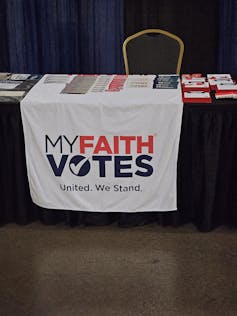
Promotional sign on the Courage Tour for My Faith Votes, an organization that encourages voters to vote biblically.
Michael E. Heyes, CC BY
Demonizing queerness
The speakers further claimed that this demonic Marxism was perverting the educational system in the United States. For example, numerous speakers criticized schools for supposedly indoctrinating or “evangelizing” children with “LGBTQ ideologies.”
Wallnau even suggested that the “trans movement” began “in the days of Noah” when the fallen angels of Genesis 6 married human women and had hybrid children. This echoes a discussion Wallnau and Rick Renner had on the “Lance Wallnau Show,” linking such “ideologies” to fallen angels and the Apocalypse.
This negative view of nontraditional gender and sexual orientations is a long-lived feature of the group. John Weaver, a scholar of religion, notes in his book “The New Apostolic Reformation” that the group’s ideas are indebted to conservative theologian Rousas John Rushdoony, who supported the death penalty for homosexuals.
Likewise, religion scholar Damon T. Berry writes that members of the movement believe that “demonic spirits” are “acting to subvert the will of God through aspects of culture like the toleration of homosexuality, abortion, addiction, poverty and political correctness.”
Wallnau encouraged the audience on the Courage Tour to “fight for your families because I don’t want to leave behind a demonic train wreck for my children.”
As hard as it is to believe, one of the most important questions of the election might well be – how many Americans believe in demons?
(Michael E. Heyes, Associate Professor and Chair of Religion, Lycoming College. The views expressed in this commentary do not necessarily reflect those of Religion News Service.)

The Conversation religion coverage receives support through the AP’s collaboration with The Conversation US, with funding from Lilly Endowment Inc. The Conversation is solely responsible for this content.



